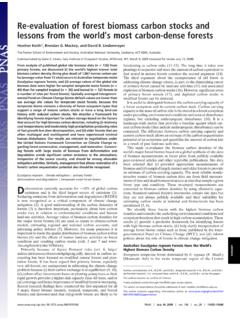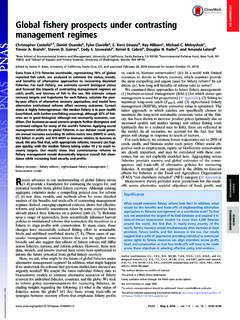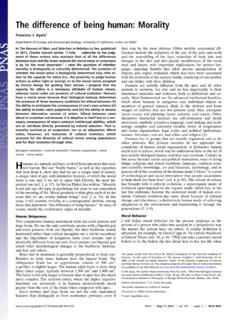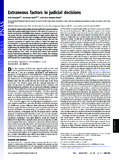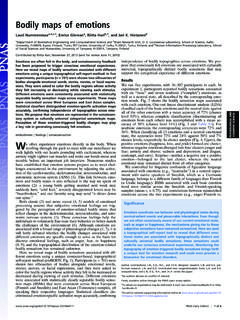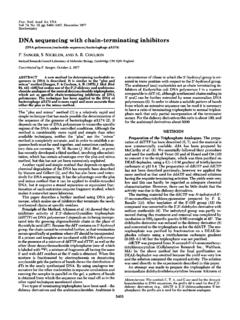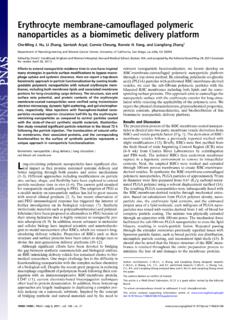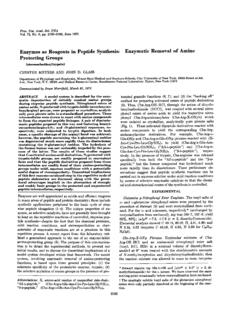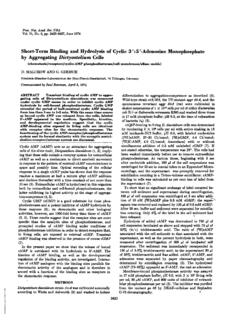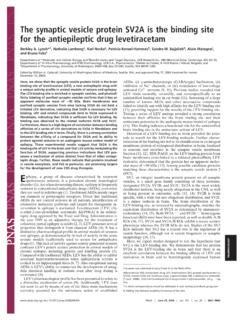Transcription of The search engine manipulation effect (SEME) and its ...
1 The search engine manipulation effect (SEME) and its possible impact on the outcomes of elections Robert Epstein1 and Ronald E. Robertson American Institute for Behavioral Research and Technology, Vista, CA 92084. Edited by Jacob N. Shapiro, Princeton University, Princeton, NJ, and accepted by the Editorial Board July 8, 2015 (received for review October 16, 2014). Internet search rankings have a significant impact on consumer Primacy effects in particular have been shown to have a favor- choices, mainly because users trust and choose higher-ranked able influence on the formation of attitudes and beliefs (18 20), results more than lower-ranked results.
2 Given the apparent power enhance perceptions of corporate performance (21), improve rat- of search rankings, we asked whether they could be manipulated ings of items on a survey (22 24), and increase purchasing behavior to alter the preferences of undecided voters in democratic (25). More troubling, however, is the finding that primacy effects elections. Here we report the results of five relevant double-blind, have a significant impact on voting behavior, resulting in more randomized controlled experiments, using a total of 4,556 un- votes for the candidate whose name is listed first on a ballot (26.)
3 Decided voters representing diverse demographic characteristics 32). In one recent experimental study, primacy accounted for a of the voting populations of the United States and India. The fifth 15% gain in votes for the candidate listed first (30). Although experiment is especially notable in that it was conducted with primacy effects have been shown to extend to hyperlink clicking behavior in online environments (33 35), no study that we are eligible voters throughout India in the midst of India's 2014 Lok aware of has yet examined whether the deliberate manipulation of Sabha elections just before the final votes were cast.
4 The results of search engine rankings can be leveraged as a form of persuasive these experiments demonstrate that (i) biased search rankings can technology in elections. Given the power of order effects and the shift the voting preferences of undecided voters by 20% or more, impact that search rankings have on consumer attitudes and be- (ii) the shift can be much higher in some demographic groups, and havior, we asked whether the deliberate manipulation of search (iii) search ranking bias can be masked so that people show no rankings pertinent to candidates in political elections could alter awareness of the manipulation .
5 We call this type of influence, the attitudes, beliefs, and behavior of undecided voters. which might be applicable to a variety of attitudes and beliefs, It is already well established that biased media sources such as the search engine manipulation effect . Given that many elections newspapers (36 38), political polls (39), and television (40) sway are won by small margins, our results suggest that a search engine voters (41, 42). A 2007 study by DellaVigna and Kaplan found, company has the power to influence the results of a substantial for example, that whenever the conservative-leaning Fox televi- number of elections with impunity.
6 The impact of such manipula- sion network moved into a new market in the United States, tions would be especially large in countries dominated by a single conservative votes increased, a phenomenon they labeled the search engine company. Fox News effect (40). These researchers estimated that biased coverage by Fox News was sufficient to shift 10,757 votes in |. search engine manipulation effect search rankings | Internet influence | Florida during the 2000 US Presidential election : more than |. voter manipulation digital bandwagon effect enough to flip the deciding state in the election , which was carried by the Republican presidential candidate by only 537.
7 Votes. The Fox News effect was also found to be smaller in R ecent research has demonstrated that the rankings of search results provided by search engine companies have a dramatic impact on consumer attitudes, preferences, and behavior (1 12);. television markets that were more competitive. We believe, however, that the impact of biased search rankings on voter preferences is potentially much greater than the influ- this is presumably why North American companies now spend ence of traditional media sources (43), where parties compete in more than 20 billion US dollars annually on efforts to place re- sults at the top of rankings (13, 14).
8 Studies using eye-tracking Significance technology have shown that people generally scan search engine results in the order in which the results appear and then fixate on We present evidence from five experiments in two countries the results that rank highest, even when lower-ranked results are suggesting the power and robustness of the search engine more relevant to their search (1 5). Higher-ranked links also manipulation effect (SEME). Specifically, we show that (i) bi- draw more clicks, and consequently people spend more time on ased search rankings can shift the voting preferences of un- Web pages associated with higher-ranked search results (1 9).
9 A decided voters by 20% or more, (ii) the shift can be much recent analysis of 300 million clicks on one search engine found higher in some demographic groups, and (iii) such rankings can that of those clicks were on the first page of search results, be masked so that people show no awareness of the manip- with on the first result and on the second (7). The ulation. Knowing the proportion of undecided voters in a study also reported that the bottom item on the first page of population who have Internet access, along with the pro- results drew 140% more clicks than the first item on the second portion of those voters who can be influenced using SEME, page (7).
10 These phenomena occur apparently because people trust allows one to calculate the win margin below which SEME. search engine companies to assign higher ranks to the results best might be able to determine an election outcome. suited to their needs (1 4, 11), even though users generally have no idea how results get ranked (15). Author contributions: and designed research, performed research, contributed Why do search rankings elicit such consistent browsing be- new reagents/analytic tools, analyzed data, and wrote the paper. havior? Part of the answer lies in the basic design of a search The authors declare no conflict of interest.
